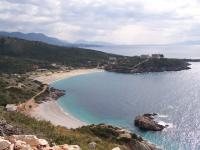 The World Bank Board of Executive Directors acknowledged in a meeting on Tuesday that a project meant to safeguard Albania’s coastal zones was used to selectively demolish parts of a village in southern Albania and leave many families homeless.
The World Bank Board of Executive Directors acknowledged in a meeting on Tuesday that a project meant to safeguard Albania’s coastal zones was used to selectively demolish parts of a village in southern Albania and leave many families homeless.
An inspection report by the International Development Association, IDA, published by Balkan Insight on January 31, revealed that a project on coastal zones management had contributed to the demolition of several informal settlements in the village, contravening the bank’s policies on forced displacement.
A Bank management report and action plan acknowledged serious errors in project preparation and supervision, along with errors in communication.
“From basic project management to interactions with the Board and the Inspection Panel, the Bank’s record with this project is appalling,” said World Bank Group President Robert B. Zoellick.
Zoellick has requested the Bank’s Acting General Counsel investigate matters, and has separately referred matters to the Bank’s Department of Institutional Integrity.
“We take very seriously the concerns raised by the Inspection Panel and we are moving promptly to strengthen oversight, improve procedures, and help the families who had their buildings demolished. The Bank cannot let this happen again.”
Under the Action Plan, a series of measures will be undertaken with support by the Bank, including a case-by-case legal review of the April 2007 demolitions in the project area, the appointment of an Independent Observer to monitor the legal review and report back to the Bank, and the payment of legal aid for the review of each of the claimants’ cases.
Bank management will also supervise the completion of a social and vulnerability assessment, and the retroactive application of an assistance packages for those affected by the demolitions.
The investigation by the inspection panel found that World Bank management failed to comply with its policies with respect to the design, appraisal and implementation of the project, harming the local people affected by it. The probe also found that WB assisted the demolition by pressuring local construction police to take action and by supplying them with equipment and aerial photos.
In addition to the project’s failure to comply with World Bank policies, the investigators noted allegations of corruption and complaints that the demolition of the Jale settlements was part of a bigger scheme to develop the area as a tourist resort. While the panel does not evaluate these allegations, it concludes that the selective demolition carried out by construction police supports the intention to clear the area.
The investigative panel also accused World Bank management of misrepresenting facts during the probe and hampering the investigation by withholding access to data, while it notes the unusual lack of recollection of facts and crucial events by staff. Investigators say that several WB staff members both in headquarters and on the field were “coached” to provide unusually consistent but factually incorrect or misleading information.
“While the Bank’s non-compliance with its policies in the present case is extremely troubling” said the chair of the Inspection Panel, Werner Kiene.
 Eurasia Press & News
Eurasia Press & News
